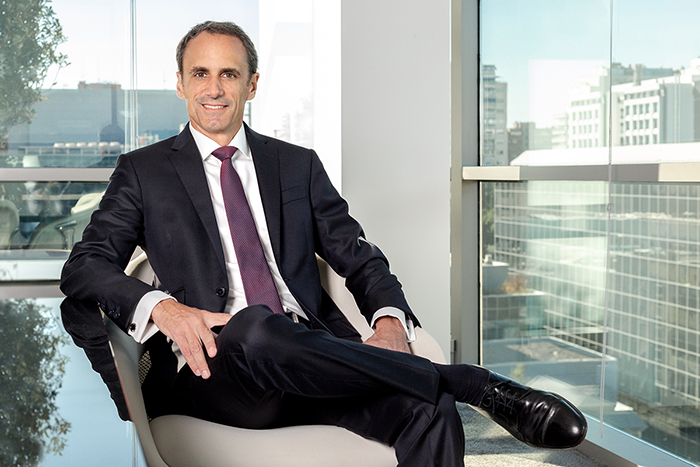According to Rafael Brugnini, CEO of SAP Spain, companies should not only be concerned about measuring customer satisfaction, but also employee satisfaction. Getting companies to improve their business by analyzing their data is their biggest challenge.
Artificial intelligence (AI), automatic learning, cloud, data analytics and internet of things (IoT) are some of the terms that appear most in the vocabulary of the general manager of SAP Spain, Rafael Brugnini. The veteran technology giant no longer focuses its business on what used to be its star product: enterprise resource management software. Instead, the company has diversified its product portfolio to help companies adopt all those technologies.
But for them to successfully integrate them, Brugnini believes they must be led by a CEO willing to change course. The person in charge says: "You have to try and if it doesn't work, we will have learned something". He acknowledges that "when you are used to controlling everything, opening up to experimentation can be complicated". However, he defends the importance of leaders setting an example and promoting change.
Each year, MIT Technology Review publishes a list of the 10 technologies with the greatest potential to change the world. This year's list includes artificial intelligence conversation assistants. How has SAP-integrated these systems into the products it offers customers?
This technology is beginning to be embedded in the main business processes to facilitate interaction with the human being and automate all repetitive tasks. In this way, you can use all the capacity and knowledge that people in the company have in tasks that generate more value.
In the case of these conversational assistants, we have incorporated this technology through the acquisition of a company [Recast.AI], which allows employees to interact with the voice with Siri and Alexa to ask what tasks they have to perform that day, ask them to send them a report and also receive recommendations.
Another of the great technological trends that SAP has integrated is big data since you offer business analytics tools. How has the company adapted to the era of data?
We defend the concept of an intelligent company, one that maximizes the use of data for its benefit and for that of its customers. But software companies have bombarded customers with technology in recent years. Today, there are a lot of Frankenstein created by different technologies from different suppliers and we are seeing how we can simplify this so that everything is integrated and there is no need to train one person in 18 technologies from 18 different manufacturers.
In the analytics part, we not only want to manage the data generated by the SAP systems, but also by all the company's systems and have a single version of the data. Therefore, we offer the possibility of having our data architecture without it being necessary to have our applications.
The revolution in the world of data is being made possible thanks to the internet of things, which give us access to unprecedented information. SAP makes it easier for companies to draw conclusions from the data coming from these connected devices. How is this knowledge helping them?
We are seeing cases in which, as a result of applying technology, new business models emerge. For example, we started working on the sensorization of an air compressor manufacturer in Germany. In the beginning, they wanted to perform predictive maintenance, that is, to anticipate the failure before it happened. But they didn't stop there, they asked themselves, "How do we mix IoT information with the entire supply chain?"
They started to play with automatic learning to optimise the service and realised that they could have so much control that, instead of offering traditional compressors as products, they could sell air as a service, as a service, and the customer would pay a monthly fee.
Another example is a Chinese shoe manufacturer. As more and more personalized products are demanded, they scan your foot and with virtual reality, you can select colors, models, and so on. In seven days you return to the store and you have a shoe that fits you perfectly because the entire supply chain is connected and the process is automated.
IoT generates a lot of device data, but now it's also a trend in vogue for people analytics, a discipline that studies data on employee behavior. Are you already offering it to your customers?
In recruiting, we are using artificial intelligence to match curricula with the profile being sought. We help companies write job descriptions so they really reflect what they need.
On the other hand, it is also very important to measure employee experience. Qualtrics [a platform specialising in experience data management, which SAP acquired a few months ago for around €7.3 billion] allows employees to take their temperature in real-time so that they can react quickly. In fact, we offer the service in two areas, human resources and customer experience.
How does it help companies to know how employees feel all the time?
On the one hand, new generations think completely differently and are much more mobile. In the past, one valued being in a big company, stability, making a career, etcetera. Now, they feel little less than a phobia towards big companies: when you do an interview, they ask you about the schedule, flexibility, corporate social responsibility, workspace, holidays, the purpose of the position... Employees are riskier, more enterprising. If you take their temperature, you have more ability to react and retain.
On the other hand, if workers are happy, we give better service to customers, we bill more and we are more profitable. There is a direct impact between employee happiness and business success. Innovation is in listening to your customers and employees.

Traditionally, SAP has been based on the license sale model, but is now collaborating with other companies to study how they can integrate different technologies. Has it been easy to adapt the business model and performance indicators to that change?
We are one of the most unfairly evaluated companies in the market. SAP is expected to grow and adapt the cloud faster than anyone else and at the same time that the utility it reports every year grows.
It is a complicated balance, because the yardstick with which we are measured is not the same as that with which we measure others, who are not even asked how much money they earn or how many taxes they pay in Spain. Despite this, we are moving quite quickly, the sales cloud TCV (Total Contracts Value) already represents around 65% in our country and we are working on a cultural change in the way of selling.
SAP is a company with a long trajectory, but in recent years new technology companies have arrived that are entering the software market, data intelligence, and the cloud. How do you approach the entry of new competitors in the sector?
In the business arena, SAP has a brutal leadership position and many companies are not strong in that market, so we approach it from a collaborative point of view. In fact, we are in permanent contact with companies such as Amazon, Microsoft, Google or Apple.
For now, these are opportunities for the businesses of both companies to grow. Obviously, there are areas of conflict, but as the business opportunity is so great, we are getting very much in agreement and respecting the spaces.
SAP helps other companies tackle the digital transformation. What qualities do you think the CEO of a traditional company must have to undertake these changes and what advice would you give him?
First of all, he must have an open mind to listen, to raise his head and be open to everything that is happening in the world, as it is happening very fast. And secondly, to have minimal digital capabilities, to understand that technology can help you accelerate certain things and change the business model.
Finally, it has to be a bit risky, realize that you're going to have to experiment, that you can make a mistake.
What strategies do you follow for your employees to develop new skills and maintain an innovative mentality?
When it comes to internal issues, we have SAP Academy. We look for young profiles that combine technology and business knowledge, and offer them internships and training in Silicon Valley (USA). When they return, they come back to their jobs, ready to deal with customers to transform their businesses.
In the area of innovation, we have One Billion Lives, a corporate intra-entrepreneurship program, where teams made up of employees from the countries compete to provide creative solutions to solve a problem in society.
Externally we have a program, YPP, with which we look for unemployed young people, we train them and help them find work, because the SAP ecosystem has 0% unemployment. In this sense, we are working on an initiative to train 1,500 SAP consultants in two years in Spain.
We approach innovation in our employees from different angles, as it is a permanent challenge. Many times, employees' resistance to change is due to not being shown the big picture.
By Cristina Sánchez



